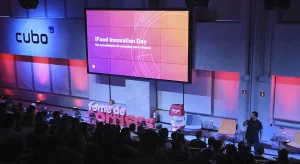When talking about innovation, the word itself already comes with a lot of attached meanings. After all, innovation can be, for example, disruptive (something completely new that breaks with standards), incremental (improving what already exists) or open (exchanging ideas even with a competitor).
But this is just the beginning. There are a series of words linked to this universe that make people frown. If you've ever received an invitation to a hackathon or a brainstorming session and thought about looking for a dictionary, here's a list of the main terms linked to innovation so you don't mess up in this creative ecosystem.
A
Capital opening – process in which a company transfers its ownership to a large number of people who wish to participate in the business by purchasing shares.
Accelerator – company that invests in startups with innovative solutions to help attract investment and develop customers.
Development agency – research support entity that offers lines of credit to finance the implementation of industrial development projects.
Assessment – evaluation of people to execute a given challenge.
B
big data – database captured in interaction with users, computers, machines and equipment and which can generate intelligence to predict behaviors and other phenomena.
Blockchain – interconnected network in blocks in which users validate information among themselves, enabling greater data security and validation of authenticated information.
Bootcamp – pre-immersion event to prepare participants for the mental model of a proposed challenge.
Bootstrap – start a business with your own resources and spend as little as possible.
Brainstorming – group session to give ideas on how to solve a problem or achieve a goal in an innovative way.
W
Venture capital – financial resources applied to capitalize companies that are in the initial stage of development.
Seed Capital – resource raised for a business that is in its initial phase – an investment to take the first steps.
Certification – procedure to certify, in a formal document, that the company has personnel qualifications, processes, procedures or items that are in accordance with the specific applicable needs.
Public call – competition in which companies are selected to promote a cooperative project in a certain area of knowledge or consortium activities between companies and research institutions to develop an innovation.
Data scientist – or data scientist; professional who works with technologies and projects related to Artificial intelligence.
Cluster – set of companies and organizations that come together and interact with each other to enhance benefits such as attracting more capital, gaining dynamism or innovating as a group.
Cryptocurrency – digital currency whose value is defined based on supply and demand, governed by the market, not by governments.
Crowdfunding – crowdfunding of a project or prototype, which can be in the form of a full donation or participation in the business in return for the investment.
D
Design thinking – is a type of project development that seeks to solve problems in an interdisciplinary and collaborative way (and not just from the consumer's point of view).
Technological diffusion – propagate an innovation among potential users to make improvements and adapt the technology to user behavior.
AND
Collaborative economy – activities based on the shared use of goods, spaces and instruments, which prioritize use over property.
Effectuation – dynamic and creative process to develop new ideas in an entrepreneurial environment.
Scalability – ability to replicate a product or service easily, to serve a large market.
F
Direct funding – systematic action by scientific and technological development agencies in the search for opportunities to promote innovation in companies and research organizations.
Front end – part of a website that is visible to the user.
Participation Mutual Fund – fund that allocates resources raised from institutional investors to capitalize emerging companies.
G
Gamification – use of game elements in non-leisure activities to increase people’s engagement with a certain activity.
Growth Hacking – work model that looks for opportunities or gaps (hacks) for success and creates strategies aimed at quick results for the company’s growth.
H
Hackathon – marathon that brings together professionals linked to software development to create specific and creative solutions for one or several challenges.
HCD – Human-Centered Design, a design and management process to include the human perspective in all problem-solving processes.
I
Ideation – structured process to generate many ideas in a short space of time, using techniques such as brainstorming and empathy maps.
Business incubator – an environment that houses start-up companies and offers management advice and the infrastructure and services necessary to develop a new business.
Open innovation – search for new ideas and technologies outside the company environment, in cooperation with research institutions, suppliers and even competitors.
Artificial intelligence – intelligence demonstrated by machines, especially in data analysis.
IoT – internet of things, that is, the connection of objects using sensors so that they exchange information with each other.
Iteration – repetition of a process to get closer to the desired objective.
J
User journey – representation of the experiences that consumers have with a company’s touchpoints or technology interfaces.
L
Lean Canvas – summary table for presenting a business with points to understand whether it is worth developing an idea.
M
Maker – person who has technical capacity and deftly executes the materialization of solutions (hardware and software).
Meetup – themed meeting to share knowledge, share ideas and socialize with new people.
Mockup – visual model of what a digital solution being developed will look like (widely used in application development).
MVP – acronym in English for “minimum viable product”, is the simplest version of a product or service that can be launched on the market.
N
NDA – or Non-Disclosure Agreement, is a confidentiality agreement in the relationship with partners so that confidential information about an innovation does not become public.
Networking - Network.
O
Onboarding – techniques to acclimatize the user to a new platform.
Open Source – open source project, which can be changed by any user who creates other programs or software.
P
Technologic Park – spaces that create favorable conditions for technologies developed in universities and research institutes to be transferred to the production sector, with the birth of technology companies.
Patent – official document that describes an invention and defines how it can be exploited with the authorization of its holder.
Peer to peer (or P2P) – relationship between peers within a network (following collaborative logic).
Persona – user profile developed to get an idea of who the target audience is for a new product or service.
R&D – acronym for Research and Development, scientific research that leads to development for a specific industry or segment.
Prototype – original model representing some new creation, which has the essential characteristics of the product and will still be tested by the company.
Q
Quick Win – moment when the customer quickly achieves success in executing one or more key actions.
R
Augmented reality – integration between the physical and virtual world by showing something virtual in an existing location or vice versa.
Roadmap – “road map” in English; it is the evolution projected by companies in their product/functionality over time.
s
scrum – visual methodology to monitor projects in 3 phases: activity base, what is to be done and what has already been accomplished.
Serendipity – moment when a person, by chance, makes a discovery or finds the solution to what they were researching.
Spin-in – creation of products and services that can be absorbed by a parent company, a business that already exists.
Spin off – creation of a new company with innovative products or services, initially created from an innovative project started in a “parent company”.
T
Technology transfer – process of purchasing national or foreign technologies considered of interest for the technological capacity of a company and that contribute to the economic and social development of the country.
U
UX – acronym in English for user experience, a work that maps the user's experience with the product or service to evaluate whether it is easy and pleasant to use.
V
Validation – process of confirming business hypotheses through direct interviews, interaction with customers and users.
Z
Zone to win – methodology used by traditional companies to implement an innovation.


